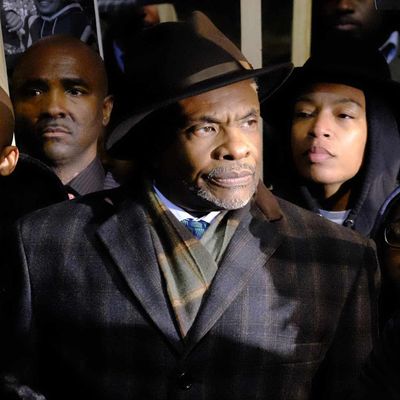
The new OWN series Greenleaf is set in and around an African-American megachurch in Memphis, Tennessee, where a beloved pastor (Keith David) shepherds a 4,000-member congregation as his children jockey for power in the family dynasty, and local cops and politicians curry favor and cover up crimes. Created by Craig Wright (Dirty Sexy Money), it’s a solid nighttime soap made noteworthy by its deep-bench cast of actors, its regional Southern atmosphere, and most of all, its attention to the philosophical divisions, scripture, and music of the family’s church.
The latter are responsible for the high points of early episodes; tonight’s pilot, for instance, is a typically clunky expository affair — when’s the last time you saw an inaugural episode of a series that didn’t trip over its own character introductions? But when the family debates the merits of vigorously declared Christianity versus undefined spirituality over dinner, or when David’s character, Bishop James Greenleaf, delivers a sermon that’s addressed to the congregation but specifically directed at his estranged daughter, the Phoenix-based TV reporter Grace “Gigi” Greenleaf (Merle Dandridge), the show roars to life, melding oratory, sentimentality, and gospel music into an ecstatic whole, and making you feel as if you’re sitting in the pews with the characters, considering putting something extra in the collection basket.
One of the persistent failings of movies and TV shows about talented people is that they never entirely manage to convince you that all the characters are as good at their jobs as the show claims they are. Greenleaf never has that problem. David’s voice is a musical instrument that the actor plays with virtuoso control. The actors cast as his children — in particular gospel star Deborah Joy Winans of the Winans family, who plays Charity Greenleaf-Satterlee, the bishop’s youngest daughter and the church’s musical director — are convincing as charismatic, driven, eloquent people of faith who all harbor hypocrisies and sometimes commit grave sins, but believe wholeheartedly in the gospel they preach.
When Greenleaf drifts away from the pulpit and the family dinner table and embraces its genre roots as a Dallas-Dynasty-Empire–type potboiler, it’s on shakier ground; but here, too, the emphasis on spirituality, morality, and civic obligation gives the material a weight it might not have on a secular soap. The series has lots to say about the uneasy moral position of megachurches like the Greenleafs’, where the bishop and his wife, Lady Mae (Lynn Whitfield), have a private jet, Power Ball winners drop $50,000 checks in the collection plate, and senators and disgraced cops stop by seeking private counsel that has little to do with the teachings of Jesus. And there are strong, ongoing subplots having to do with sexual misconduct, police brutality, and official corruption, articulated a bit too bluntly to pass for great drama, but with such fervor that you might not mind. Oprah Winfrey, the owner of OWN, an executive producer on Greenleaf, and a formidable actress, brings plenty of juice to too-few scenes as the heroine’s aunt, a Memphis blues bar owner and community conscience — she gets a great introduction, a close-up of her hand pouring tonic water into a tumbler filled with ice — but it’s painfully clear that she’s been partitioned off from the main cast for ease of scheduling. (At points her performance, lively as it is, is literally phoned in.)
But these missteps and others are a small price to pay for a show that tells a story we haven’t seen on TV before, with cultural specificity, while delivering the schemes, temptations, double-crosses, and kiss-offs you want from a nighttime soap. Greenleaf packs a lot of plot into its first few episodes, building gracefully to revelations and confrontations, and playing to its actors’ strengths. Whitfield, no surprise, might be the show’s breakout character, a conniver with a regal death-stare. Her first line, greeting Grace and her teenage daughter as they arrive at the family’s gated, Xanadu-vast compound, is, “Promise me you’re not here to sow discord in the fields of my peace.” Now that’s an entrance.


